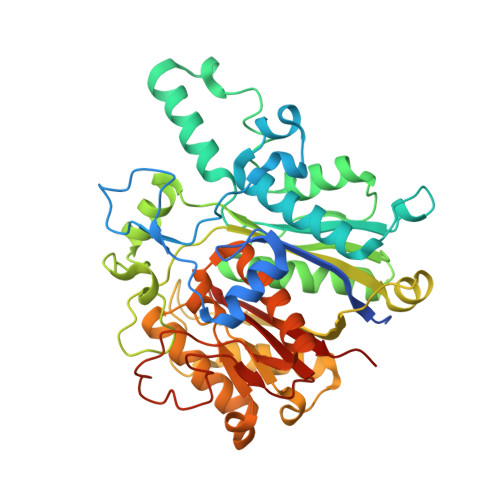Structures of Pseudomonas aeruginosa beta-ketoacyl-(acyl-carrier-protein) synthase II (FabF) and a C164Q mutant provide templates for antibacterial drug discovery and identify a buried potassium ion and a ligand-binding site that is an artefact of the crystal form.
Baum, B., Lecker, L.S., Zoltner, M., Jaenicke, E., Schnell, R., Hunter, W.N., Brenk, R.(2015) Acta Crystallogr Sect F Struct Biol Cryst Commun 71: 1020-1026
- PubMed: 26249693
- DOI: https://doi.org/10.1107/S2053230X15010614
- Primary Citation of Related Structures:
4B7V, 4JB6, 4JPF - PubMed Abstract:
Bacterial infections remain a serious health concern, in particular causing life-threatening infections of hospitalized and immunocompromised patients. The situation is exacerbated by the rise in antibacterial drug resistance, and new treatments are urgently sought. In this endeavour, accurate structures of molecular targets can support early-stage drug discovery. Here, crystal structures, in three distinct forms, of recombinant Pseudomonas aeruginosa β-ketoacyl-(acyl-carrier-protein) synthase II (FabF) are presented. This enzyme, which is involved in fatty-acid biosynthesis, has been validated by genetic and chemical means as an antibiotic target in Gram-positive bacteria and represents a potential target in Gram-negative bacteria. The structures of apo FabF, of a C164Q mutant in which the binding site is altered to resemble the substrate-bound state and of a complex with 3-(benzoylamino)-2-hydroxybenzoic acid are reported. This compound mimics aspects of a known natural product inhibitor, platensimycin, and surprisingly was observed binding outside the active site, interacting with a symmetry-related molecule. An unusual feature is a completely buried potassium-binding site that was identified in all three structures. Comparisons suggest that this may represent a conserved structural feature of FabF relevant to fold stability. The new structures provide templates for structure-based ligand design and, together with the protocols and reagents, may underpin a target-based drug-discovery project for urgently needed antibacterials.
Organizational Affiliation:
Institut für Pharmazie und Biochemie, Johannes Gutenberg-Universität, Staudinger Weg 5, 55128 Mainz, Germany.

















